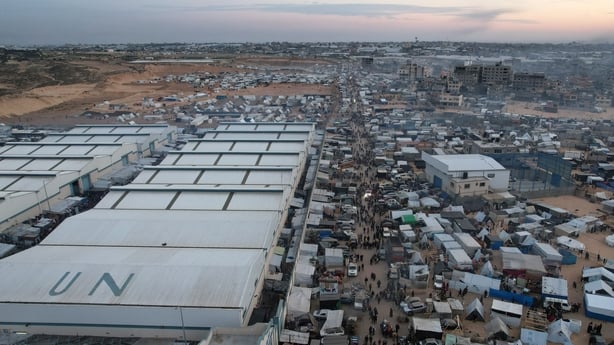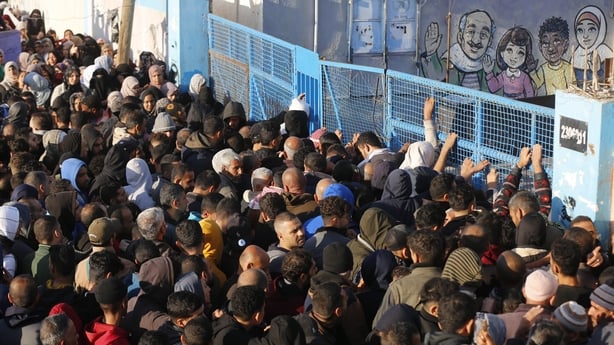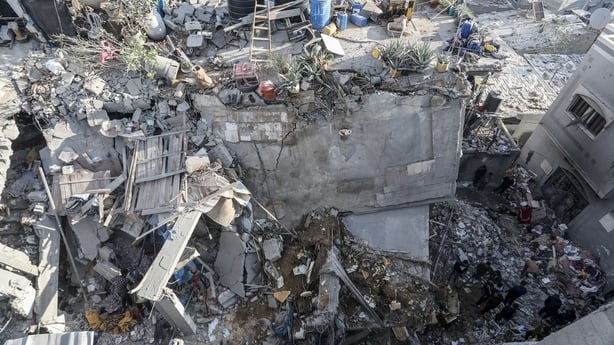Israel battled Hamas militants in Gaza's biggest cities and said it had attacked dozens of targets, killing 350 Palestinians and leaving the rest struggling to survive in rapidly shrinking areas of refuge.
Gazans crammed into Rafah on the southern border with Egypt, heeding Israeli leaflets and messages saying that they would be safe in the city after successive warnings to head south.
But more than 20 people were killed in apartments there last night sheltering displaced civilians from the north, said Eyad al-Hobi, a relative of some of those killed.

"All apartments in the building suffered serious damage," he said as people brought out two apparently lifeless children.
Another relative, Bassam al-Hobi, said the building had been hit by three rockets.
"They targeted women and children, as you can see, and the guests who were told the south would be safe," he said, gesturing to bodies wrapped in white cloth, some small, lined up on the ground and surrounded by mourners.
Elsewhere in Rafah, medics said four people had been killed while travelling in a rickshaw today.
Israel said militants had fired at least one rocket from Rafah and 12 from the desolate area of Al Mawasi on Gaza's southern Mediterranean coast where it has also advised displaced people to gather, leaving the status of the areas unclear.
In southern Gaza's largest city, Khan Yunis, Israel said its forces killed a number of gunmen, including two militants who emerged firing from a tunnel. Residents reported several Israeli air strikes and non-stop tank fire in the city's east.
New phase
Israeli troops reached the heart of Khan Yunis yesterday in a new phase of the war that is now entering its third month. Health officials said three people were killed there today.
Ambulances and relatives rushed the wounded, including women and children, into the city's Nasser hospital, but even the floor space inside was already full.
Two badly wounded children lay on one trolley and a dust-covered and bloodstained young boy lay screaming among the patients on the floor.
"The injuries are very severe," said doctor Mohamed Matar. "The situation is catastrophic in all senses of the word...We can't treat the injured in this state."

Those who escape violence face an increasingly desperate struggle to survive.
Ibrahim Mahram, who fled to Al Mawasi, said five families were sharing a tent in the former Bedouin village, which refugee organisations say lacks shelter, food and other necessities.
"We suffered from the war of cannons and escaped it to arrive at the war of starvation," he told Reuters.
"We divide one tomato between all of us."
The UN Palestinian Refugee Agency (UNRWA) said 1.9 million people - 85% of Gaza's population - had been displaced, its shelters were four times over capacity, and there was not enough aid to meet "the overwhelming needs".
UN refugee chief Filippo Grandi said pressure was growing in the south of the enclave near Egypt.
"People are piling up in the little sliver of land between Khan Yunis and the Rafah border," he told Reuters.
Egypt said it would not allow Gazans to be pushed across its border. Diaa Rashwan, head of the State Information Service, added that Egypt believed Israel was also trying to force Palestinians in the West Bank towards Jordan.

The spokesman for the Gaza health ministry said 17,177 Palestinians had been killed and 46,000 wounded since 7 October, when Israel began bombarding Gaza in response to a cross-border rampage by Hamas militants who control the enclave.
In the past 24 hours alone, 350 people had been killed, Ashraf Al-Qidra said.
Israel claims it must wipe out Hamas in Gaza and the West Bank for the sake of Israelis and Palestinians and is doing everything possible to get civilians out of harm's way.
Bombing and gun battles
Residents in Gaza City in the north reported all-night bombing and fierce gun battles in Shejaia, east of the centre, and the Jabalia refugee camp further north.
Another district, Sabra, was also bombed, local people said.
Israel said it had raided a Hamas compound in Jabalia, killing several gunmen and found tunnels, a training area and weapons.
Israeli television showed scores of men, stripped to their underwear, sitting on a road. Maariv newspaper claimed they were Hamas fighters captured in Gaza City.
The armed wing of Hamas claimed its fighters had destroyed or damaged 79 army vehicles in Gaza City in the past three days but did not produce evidence.

The surprise incursion by Hamas militants who attacked Israeli towns on 7 October killed 1,200 people, with 240 people taken hostage, according to Israel's tally.
The Israeli military says 88 soldiers have been killed in ground incursions into Gaza that began on 20 October and that about a third of the reported Palestinian toll consisted of combatants, without saying how that estimate was reached.
The UN has been unable to distribute aid in any part of Gaza except for the area around Rafah for the past four days, it said in its daily humanitarian report.
A senior Hamas official told Reuters mediators were still exploring opportunities for a truce and reiterated its demand that Israel cease its attacks.
The UN Security Council received a UAE-drafted resolution yesterday demanding an "immediate humanitarian ceasefire", with a vote sought tomorrow.
